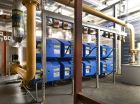Property developer saves plantroom space with Hamworthy ModuMax boilers

An award-winning residential development in Harrow has its heating and hot-water requirements met by Hamworthy Wessex ModuMax condensing boilers linked to heat-interface units in each apartment. The Stanmore Place development by St Edward offers a range of high-specification apartments with one to three bedrooms, There are also houses, office units and a multi-storey car park — set among landscaped squares and avenues.
So far, the development has 17 ModuMax boilers comprising 34 modules in five plant rooms with a total output of 7900 kW.
Nigel Hawkes, technical associate with consultant Mott MacDonald explained that the developer wanted to maximise the space available for flats and grounds, the plant rooms had to be as compact as possible. The boilers specified can be stacked vertically to minimise footprint. They also have a seasonal efficiency of over 91%.
Each plant room has four sets of 2-high boilers with a total output of 2000 kW for space heating and hot water for the block. An hydraulic interface unit in each apartment give occupants control of their heating and hot water.
The development has won a number of awards, including the Landscape Architecture for London Award.







